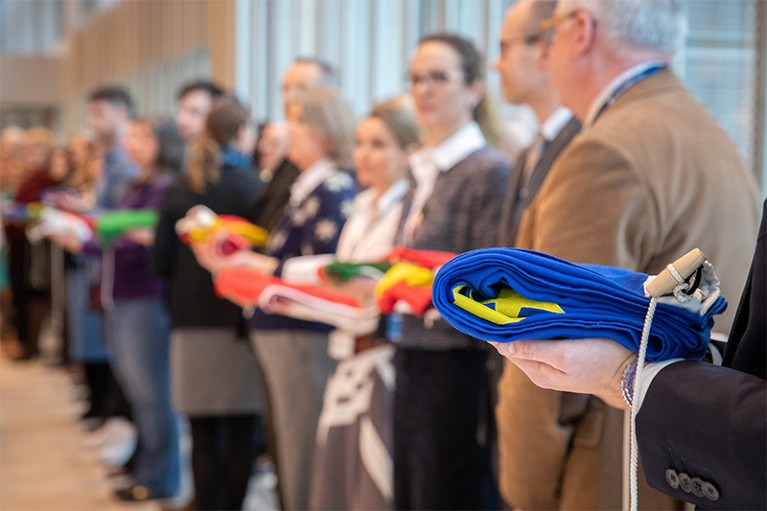EVENTS
Europe’s drug agency leaves London The European Medicines Agency, the European Union’s drug regulator, is preparing to leave its UK headquarters as a result of Brexit. Many staff have already moved to its new base in Amsterdam, and remaining UK staff lowered the flags of the 28 EU member states at the agency’s London location on 25 January. The official relocation will take place on 1 March. The agency expects to lose around 25% of its 900 employees, who did not want to move, and so will concentrate on high-priority functions this year. According to its Brexit preparedness plan, some activities, such as requests for information, developing e-submissions for drug applications and corporate governance support, will be reduced or temporarily suspended.

A row of staff at the European Medicines Agency hold bundled flags from EU countries in their London office.Credit: European Medicines Agency
Antarctic rescue A South Korean research ship has rescued 24 Chinese workers stranded on an island in Antarctica, the South Korean oceans ministry announced on 24 January. The Chinese team was constructing the nation’s fifth Antarctic research base, on Inexpressible Island in Terra Nova Bay. The workers became stranded when the Chinese icebreaker Xuelong, which was supposed to pick them up, hit an iceberg on 19 January and was forced to turn back to its base on King George Island. The South Korean icebreaker Araon, which was on a research mission near Inexpressible Island, arrived off the shore of the Chinese base on 23 January and the team was ferried to the ship by helicopter. The Araon will transport the Chinese team to New Zealand by early February.
Early outbreak The Nigeria Centre for Disease Control declared an outbreak of Lassa fever, a potentially lethal viral haemorrhagic disease, on 22 January. The agency confirmed 136 cases of the illness, including 31 deaths, between 1 and 20 January. Cases of Lassa fever typically surge during Nigeria’s dry season, which usually runs from October to April, but the number this January is unusually high. Epidemiologists speculate that the increase could be due to improvements in how officials monitor the disease, or environmental changes that increase contact between people and the rodents that harbour the virus. Nigeria’s worst Lassa-fever outbreak on record ran from January to September 2018 and involved 514 cases, including 134 deaths.
POLITICS
UK’s EU students The number of postgraduate research students at UK universities who come from other European Union countries has fallen since the Brexit referendum in June 2016, according to official data. If the trend persists, it would mark a reversal of years of growth, from around 12,700 such students in 2008–09 to more than 15,000 in 2015–16. The Higher Education Statistics Agency released the latest figures on 17 January, but UK-wide data for 2018–19 are not yet available. The Russell Group, which represents research-intensive universities, says its members have seen a 9% drop in the number of enrolments of postgraduate researchers from other EU countries in September to December 2018, compared with the same period in 2017. This is a concern, says the Russell Group, because these students are an important part of the country’s research pipeline, both for academia and industry. EU arrivals account for about one in five such students at around a dozen UK universities.
PUBLISHING
African open access The African Academy of Sciences, a pan-African organization based in Nairobi that promotes scientific research, has endorsed the open-publishing initiative Plan S, backing the efforts of funders from Europe, the United States and China. Plan S was launched in September 2018 by an international consortium of research funders called cOAlition S, and is championed by Robert-Jan Smits, the European Commission’s open-access envoy. It would require the results of research to be published in compliant open-access journals from 2020. In an 10 January letter of support to Smits, the African academy’s president, Felix Dapare Dakora, said that the continent can play a part in establishing “a mode of research communication that is designed to serve the common good, not the interests of science publishers”. The academy already requires the researchers it funds to make their research openly available. In 2017, it launched an online open-access publishing platform called AAS Open Research, for those affiliated with the academy or funded through its Alliance for Accelerating Excellence in Science in Africa.
ENERGY
Quitting coal power Germany is to end the use of coal power within 20 years, a government-appointed commission said in a report on 26 January. Despite heavily subsidized efforts to switch to renewable energy sources, coal-fired power plants (pictured) still produce almost 40% of Germany’s electricity. The country’s reliance on coal is the main obstacle to meeting its goal of cutting greenhouse-gas emissions by 55% from 1990 levels by 2030. The report proposes reducing the generating capacity of the country’s 84 coal-fired plants by one-third by 2022, and a gradual shutdown of all coal plants by 2038. The government is expected to approve these recommendations. Germany would continue to produce electricity from relatively low-carbon natural gas and from renewable sources, excluding nuclear power, which currently accounts for some 12% of electricity supply but will be phased out by 2022.

One of Germany’s 84 coal power plants, all of which face closure. Credit: Federico Gambarini/AFP/Getty
ENVIRONMENT
Doomsday stalled The world is just as close to annihilation as it was last year, according to the Bulletin of the Atomic Scientists in a 24 January announcement. The hands of the organization’s Doomsday Clock will stay at two minutes to midnight, just as they were in 2018. But the group warned that the lack of movement on a host of global threats is a “new abnormal”. Increased tensions between nuclear powers — including the United States, Russia and China — lack of action on climate change and a worsening cybersecurity and cyberwarfare situation are of particular concern, the Bulletin said. “Where we are is very close to disaster,” said astrophysicist Robert Rosner of the University of Chicago in Illinois, who chairs the group’s Science and Security Board.
Dam collapse At least 65 people are dead and nearly 300 are missing after a mining dam collapsed near Brumadinho in southeastern Brazil on 25 January. Rescue efforts at the iron-ore complex, owned by Brazilian mining giant Vale, headquartered in Rio de Janeiro, were briefly suspended on 27 January, after alarms indicated that a second dam might give way. By then, Vale reported, the torrent of mud and water from the first dam had travelled more than 60 kilometres. The catastrophe comes just 3 years after the collapse of a similar mining dam in Mariana, about 121 kilometres from Brumadinho. The latest incident has raised urgent questions about the safety of hundreds of dams in the Brazilian state of Minas Gerais. The region is the centre of the country’s mining industry.
PEOPLE
Editor steps down The founding editor of eLife, Randy Schekman, will leave the journal on 31 January. Schekman launched the open-access title in 2012 with the financial backing of three large private biomedical research funders — the Howard Hughes Medical Institute in Chevy Chase, Maryland, the Wellcome Trust in London and Germany’s Max Planck Society. The idea was to create an elite journal with freely available papers that could compete with subscription publications such as Nature and Science. Publishing in eLife was free for the first five years, and the journal pioneered a peer-review process in which reviewers and editors work together, rather than individually, to suggest revisions. Schekman announced his departure in an editorial in eLife on 23 January. He steps down to chair the advisory council of Aligning Science Across Parkinson’s, an initiative to advance research into Parkinson’s disease.
TREND WATCH
Research funding for diseases that predominantly affect people living in poverty hit a record high in 2017, according to a 23 January report by Policy Cures Research, a global-health think tank in Sydney, Australia. At US$3.6 billion, investments into ‘neglected’ diseases were higher than in any year since 2007. A surge from 2016 to 2017 included more funds to fight neglected diseases generally, as opposed to targeting individual maladies. Funders might have been inspired by the rapid progress made on new Ebola drugs, diagnostics and vaccines in response to the Ebola crisis in West Africa between 2014 and 2016, says Anna Doubell, director of research at Policy Cures Research. Still, her team says, total funding falls short of the desired $8 billion — an estimated annual target thought to be sufficient to cover the development of products that could reduce deaths and disabilities caused by dozens of neglected diseases. This figure could be achieved if countries allotted at least 0.01% of their gross domestic product to such research. Only the United States and the United Kingdom even approach that goal, set by the World Health Organization.

Source: G-FINDER/Policy Cures Research




